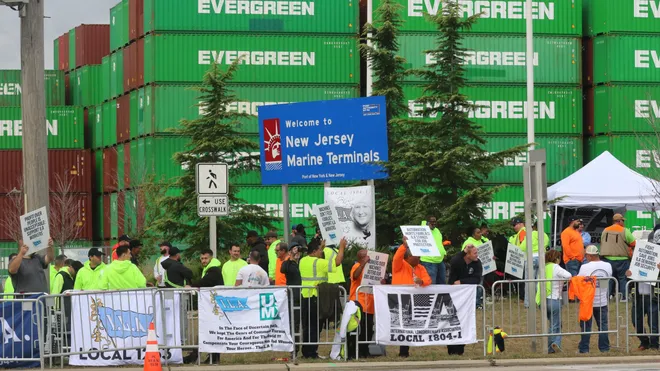US port workers and operators reach deal to end East Coast strike immediately
A three-day strike that has severely disrupted shipping on the U.S. East and Gulf Coasts is set to stop immediately thanks to a tentative agreement reached by dock workers and port owners in the United States, the parties announced on Thursday. Two people acquainted with the situation told Reuters that the tentative deal is for a pay increase of about 62% spread over six years. One of the individuals is a picket line worker who heard the announcement. In the course of the contract, that would result in an increase in average pay from $39 to almost $63 an hour.

The International Longshoremen’s Association (ILA) workers union had been demanding a 77% raise while the business group – United States Maritime Alliance (USMX) – had previously raised its offer to a nearly 50% hike. The agreement puts an end to the largest labor stoppage in almost 50 years, which prevented container ships from Maine to Texas from being unloaded and raised concerns about shortages of goods ranging from auto components to bananas, causing a backlog of anchored ships outside of major ports.
In a statement, the port operators and the union agreed to extend their master contract until January 15, 2025, at which point they will reconvene to negotiate on any unresolved matters. “Effective immediately, all current job actions will cease and all work covered by the Master Contract will resume,” added the statement. One of the biggest problems that hasn’t been handled is automation, which employees fear may result in job losses.
Harold Daggett, the head of the union, previously stated that employers, including Maersk (MAERSKb.CO), opens new tab, and its APM Terminals North America, had not complied with requests to halt port automation initiatives that pose a threat to employment. The administration of US President Joe Biden had sided with the union, citing the shipping industry’s record earnings since the COVID-19 outbreak and applying pressure on the port employers to increase their offer in order to clinch an agreement.
According to Biden, the proposed agreement “represents critical progress towards a strong contract,” which was announced Thursday. He said, “Collective bargaining works.” Calls to utilize federal authorities to end the strike, made by Republican lawmakers and industry trade associations, have been consistently rejected by his administration. Doing so would weaken unions’ support for Democrats ahead of the November elections.
The White House had been heavily involved in talks to get a deal, sources said. After days of talks, White House Chief of Staff Jeff Zients convened a 5:30 a.m. (0930 GMT) virtual meeting on Thursday with the CEOs of ocean carriers and impressed upon them the need to reopen the ports to speed hurricane recovery efforts, according to a source briefed on the events. The port strike hit just as southeastern states were struggling for supplies following a deadly hurricane. Top White House economic adviser Lael Brainard told the carriers at the meeting they needed a new offer to end the strike, and asked them to put a new offer on the table. By midday the shippers had agreed to make a new higher offer.
Acting Labor Secretary Julie Su assured the carriers that if the new offer was better, union leaders would consent to extending the contract. According to the sources, she was in New Jersey to meet with union leaders and get their approval. The ILA initiated the walkout by 45,000 port workers, its first significant work stoppage since 1977, on Tuesday after discussions for a new six-year contract broke down. Everstream Analytics reports that by Wednesday, at least 45 container vessels that were unable to unload were anchored outside the East Coast and Gulf Coast ports affected by the strike, compared to just three on Sunday before the strike started.
A total of 36 ports that handle a variety of containerized commodities were impacted by the strike, including New York, Baltimore, and Houston. “The National Retail Federation said in a statement that the decision to halt the current strike and permit the ports on the East and Gulf coasts to reopen is positive news for the country’s economy. “The sooner they reach a (final) deal, the better for all American families.”
“Cooler heads have prevailed and the ports will reopen,” stated Jay Timmons, CEO of the National Association of Manufacturers. He described the development as “a victory for all parties involved – preserving jobs, safeguarding supply chains and preventing further economic disruptions.” Because businesses have increased shipments of essential products in recent months, economists predict that the port restrictions won’t initially result in higher consumer costs. Economists at Morgan Stanley, however, predicted that a protracted shutdown would have eventually seenp through, with food prices probably reacting first.


Comments are closed, but trackbacks and pingbacks are open.